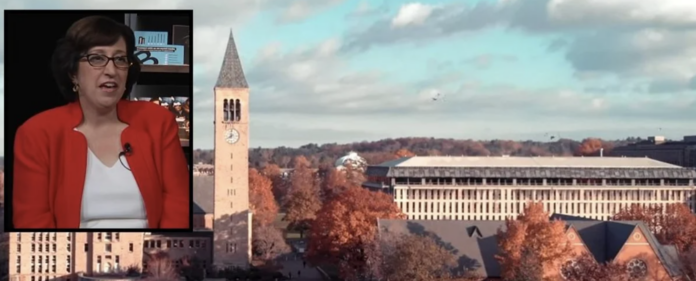A school in the Ivy League has announced that it will focus on “freedom of expression” for its theme next year. This is a direct response to the woke activists terrorizing conservatives across college campuses throughout America.
Cornell University in Ithaca announced on Monday that “freedom of expression” would be its theme for the academic year 2023-24. The announcement said that “free expression and academic liberty have always been integral parts of Cornell University’s institutional identity, and essential to its foundation.” The university will host several events each year to promote dialogue on the importance of freedom of speech and peacefully grappling controversial issues. These include guest lectures, book readings in the community, and artistic exhibitions.
Martha E. Pollack, University President, said that she was proud of the return to the foundational principles. Pollack said that it is crucial to the university’s mission to consider the freedom of speech and the challenges posed by the attacks on this right, which come from both sides of the political spectrum. Cornell’s education emphasizes learning from differences, engaging with them and communicating across them. “Free expression and academic liberty are not only the foundation of the university but also of democracy.”
Pollack, who took over the Cornell University reins in 2017, has taken several important steps to promote free exchange of ideas. He also wants to curb leftist activists that prefer to bully and interrupt their ideological opponents than engage in civil discussion. The school officially included “freedom of inquiry and expression” among its core values in 2019. School trustees reiterated these values two years later.
Some student activists continue to use “heckler’s voice” to silence conservative voices despite the strong leadership of Pollack and the Board of Trustees. Eight Cornell students were removed last November from a lecture by Ann Coulter, a conservative speaker who is a Cornell alumnus. They disrupted the presentation with shouts and chants and a loud whistle.
The school apologized later to Coulter, and those who had attended the lecture in good faith. However, the activists won out because Coulter abruptly left and cut short her speech. The school has promised to refer the students involved in the disruption “for conduct violations,” however, the outcome is not known.
Pollack’s commitment to freedom of speech has not wavered. Cornell’s Student Assembly voted unanimously a few weeks ago to require “trigger-warnings” on class topics some students may find disturbing, such as domestic abuse, rape and suicide. Pollack and Michael Kotlikoff, the university provost, overturned that vote. They claimed that a trigger warning mandate for professors violates their faculty’s right to decide what and how they teach and that it could undermine “the academic distinction of a Cornell Degree.”
Pollack and Kotlikoff emphasized that “learning to engage with challenging and difficult ideas is an essential part of a University education.” “[It’s] essential for our students’ intellectual development, and their future ability lead and thrive within a diverse society,” Kotlikoff and Pollack said.




